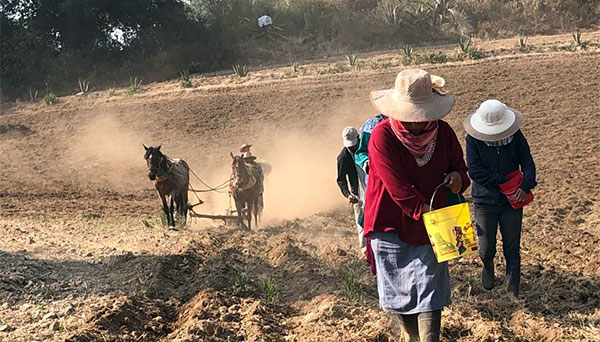Rural Women Leaders in the Adaptation to Climate Change
Organization: Consejo Civil Mexicano para la Silvicultura Sostenible
The organization contributes to improving the living conditions of rural communities in forested areas by building community institutions, strengthening their land management strategies, and enhancing their effective input in public policy-making.
Location: State of Mexico. The project will work with 10 communities in the Amanalco-Valle de Bravo Basin, in the State of Mexico, with Otomí and Mazahua Indigenous populations residing in highly marginalized locations. These are primarily farming communities that also engage in sustainable community forest management.
Country: Mexico
Other Organizations Involved: The project will be a collaboration with Ensamble Verde, A.C.
 © Consejo Civil Mexicano para la Silvicultura Sostenible
© Consejo Civil Mexicano para la Silvicultura Sostenible
Background
The project’s 10 participating communities confront a series of climate change-associated adverse effects, including increasingly intense and frequent forest fires, forest pest issues, and droughts, followed by heavy and prolonged rains that impact harvests and increase the incidence of crop pest problems.
In addition, women are subject to still greater vulnerabilities due to obstacles to their full participation in community initiatives, including limited access to land ownership, exclusion from decision-making spaces where the rules governing access to and management of natural resources are made, lower incomes than men, more time devoted to unpaid labor, and lower levels of schooling.
This project will therefore focus on women in the 10 communities: building their technical and leadership capacities and creating opportunities for their participation in sustainable natural resources management and the associated economic initiatives.
Goals
- Improve the agricultural practices of 100 families through the leadership of a group of peasant women and increase the resilience of agrifood systems to extreme climate events.
- Increase women’s participation in community decision-making spaces re the use, access to and management of natural resources, and build their capacities in terms of accessing environmental justice and equity.
- Support economic initiatives led by women to promote sustainable use of natural resources, which will reduce the vulnerability of communities—and especially of women—to the effects of climate change.
Main activities
- Build the capacities of a group of peasant women to provide training and technical assistance to other groups
- Provide training
- Support peasant families in the implementation of best agricultural practices
- Organize workshops on: a) environmental justice and equity for rural women; b) Community Forest Management for women; and c) leadership and gender equity
- Create a women’s forest fire brigade
- Facilitate women’s participation in key aspects of community forestry operations
Outcomes
- 100 peasant families implementing best practices in agricultural management
- 15 peasant women trainers are leaders who provide their peers with technical assistance
- 90 women trained in environmental justice, community forest management, leadership and gender equity
- 15 women participate in a forest fire brigade
- 10 women community councilors who have strengthened their technical, administrative and leadership capacities
- 20 women leaders in agricultural diversification activities
- 15 trained community nature tourism guides
- 20 women are participants in community sustainable forest use projects